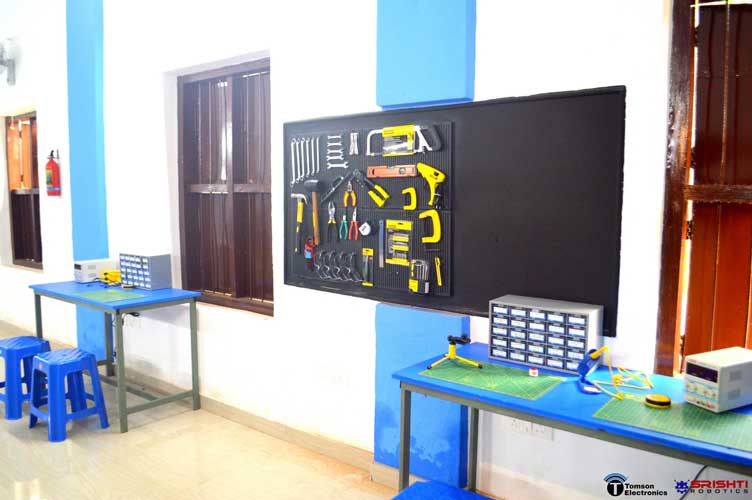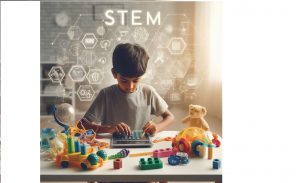Tinkering is one of the latest terms that are being used in the field of global education. With the advent of Atal Tinkering Labs, the Indian education system is all poised to join the revolution that is aimed at converting young minds into thinkers and innovators. But what actually is Tinkering and how can it help in the development of students? Let us know:
What is Tinkering?
The word has a long history. Around 700 years ago there used to be wandering tinsmiths who repaired various household items that needed just a bit of small repair here and there. It was given the name tinkering that generally means a little bit of repair or preening in an unfocused way. Now how is it connected to the education industry of today’s world? For that, we need to enter into a child’s brain. It is whimsical, curious, inquisitive and, well, naughty! But the biggest thing to consider here is that it is not focused.

A child, who is enjoying learning alphabets now with rapt attention, might see a butterfly flying around in the classroom and will start running behind it. Before you know the child’s attention towards learning alphabets is already broken and now he is all after the beautiful butterfly. Why blame the only butterfly? There are many other things that can affect a child’s attention quite instantly, right from tintinnabulation of a bell to his best friend beckoning him.
What Are The Various Types Of Tinkering Lab?
There are two types of Tinkering lab: Atal Tinkering Lab(Govt. Funded) & Tinkerly’s Tinkering Lab(customized lab with coding curriculum aligned with NEP 2020).
The Atal Tinkering Labs not only have a proper set of equipment to facilitate experimentation but also a perfect peaceful ambiance and the company of peers with the same interests that further speeds up the learning process and invites more attention. Besides, there are guides and lab assistants to ensure the safety of the students, avoid mishandling of tools and equipment and more importantly to answer the “hows, whats and whys” of students. Besides, they also offer a well-formulated initial phase of experimentation or tinkering that would then lead the students to learn, conceptualize and innovate on their own. Tinkering has already revolutionized the education structure of many developed nations with positive effects and now India is all poised to take advantage of Atal Tinkering Labs
What Is The Main Idea Behind Setting Up Atal Tinkering Labs?
Atal Innovation Mission’s objective is to establish 10,000 Atal Tinkering Labs ATLs in eligible schools. A one time financial of Rs. 10, 00,000 (1 million) will be provided by AIM towards the establishment of the Atal Tinkering Labs (ATLs) in various Indian schools for classes VI-XII. Apart from that, the schools will also be eligible for aid of additional Rs.10,00,000 (1 million) towards operational costs of the Atal Tinkering Lab (ATLs) making the entire financial support to amount Rs. 2 million for each school that is selected.
The main idea behind setting up of Atal Tinkering Labs (ATLs) is encouraging the young students to understand STEM (Science, Technology, Engineering, and Math) concepts in a practical and creative way using the specific tools and equipment. The approach is aimed at eliminating the limitations caused by monotonous classroom learning and using only textbooks as a reference without any exposure to a practical approach. The students would work with the specific tools and equipment to explore the practical relevance of STEM theories and concepts. In order to further encourage the children to exhibit their acquired talent, the timely competitions will also be held where students can exhibit their skills and talent in the form of various relevant projects.
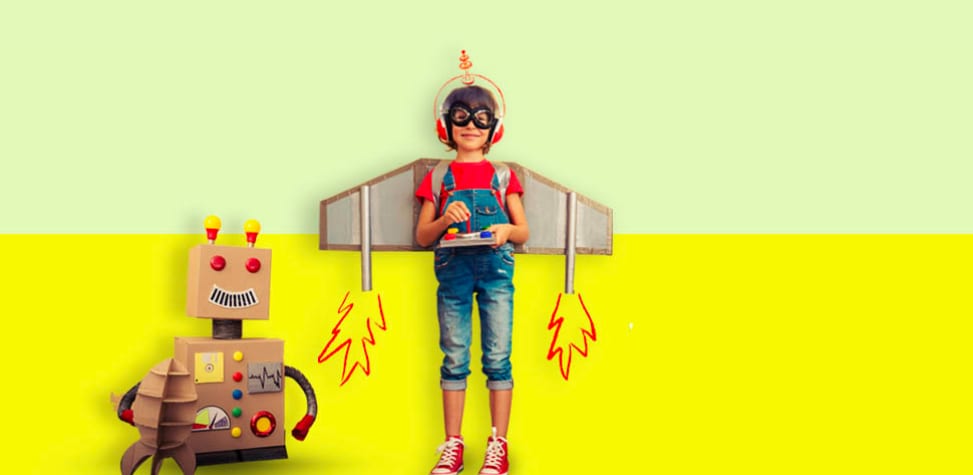
As opposed to the textbook-module of learning that could limit the interest of many students because of its monotonous character, the (Atal Tinkering Labs) ATL will offer a perfect ambiance for the students to practice their acquired knowledge and work with relevant tools that are specifically designed to exhibit the foster creativity. The Atal Tinkering Labs ATL’s will encourage the young minds to actually combine the creativity and logic by offering them do-it-yourself kits that would contain the equipment related to robotics, electronics, science, 3D printers, sensors, etc.
Any Government, private trusts or local body managed schools would be eligible to apply for Atal Tinkering Labs (ATLs). However, 25% of Atal Tinkering Lab (ATLs) would be reserved for Government Managed schools.
What Is Tinkerly’s Tinkering Lab?
It is a workplace where young minds are exposed to new age technologies of AI, IoT and Robotics that will spark their interest in the field of STEM education. This space Atal Tinkering lab scheme has reached the peak of its objective of setting up 10,000 Atal Tinkering labs in eligible schools. So, there is a slim chance for private schools to get selected by the NITI Aayog. Tinkerly’s Tinkering lab offers advanced features of technology to students that utilize this technology to invent something new. Thus, these private schools can opt for a Tinkering lab that has a curriculum aligned with NEP 2020 that teaches students from basic to advanced level skills.
What is Tinkering Lab in the context of education?
In the context of education, the tinkering lab refers to a space where youngsters can experiment with, learn, develop and conceptualize different scientific ideas. It is a lot similar to the DIY method where the students are encouraged to apply the knowledge that they have gained in the classroom. It not only helps the students to learn the real-life application and importance of the theories they have learned from their books but will also develop a natural affinity towards STEM. In fact, science is something to be “felt and experienced” rather than reading and learning.
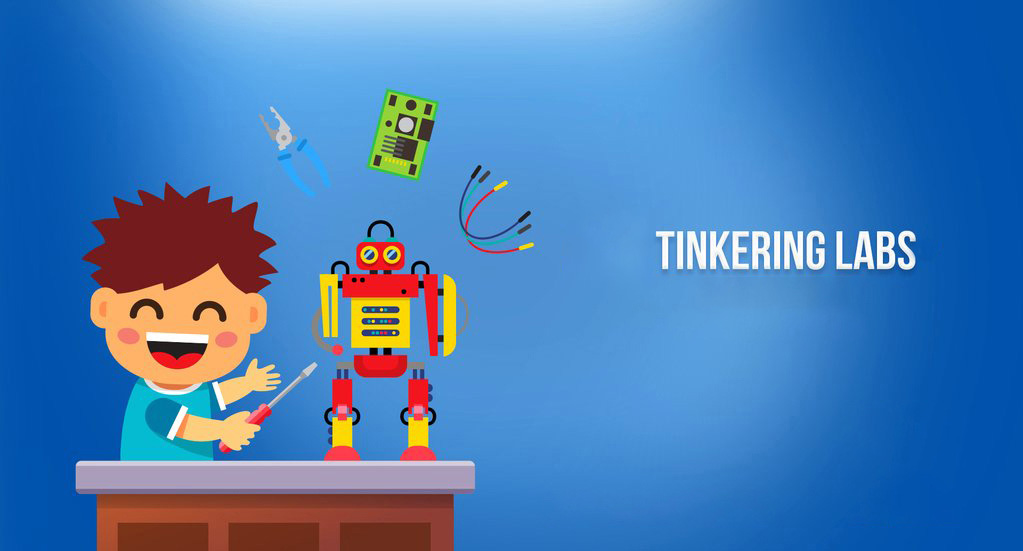
Newton did not “learn” about gravity in books but “experienced” the apple falling upon his head that led him to discover the law of gravity. In the same way, the Archimedes law was discovered when the mathematician was taking a bath and observed that sitting inside a bathtub resulted in the displacement of water, something that eventually led to Archimedes’ law. So, if the students are offered the ideal ambiance and tools for practically experiencing the theories they learned in the classroom, they would also be encouraged to dig deeper and innovate something new.
What Is The Approach Of Tinkering Lab?
Tinkerly’s Tinkering lab follows a four-step teaching methodology.

- Each class group will be provided with a challenge card.
- It consists of a real-life problem statement.
- The students have to figure out the solution to this problem statement by using the concepts of Computational & Design Thinking.
- The class will conclude with 5-10 minutes of observation cum discussion session.
- In this the students can relate how concepts of Maths and science have been applied in their respective project creations.
The year-long coding curriculum of Tinkering lab is divided into 3 main levels:
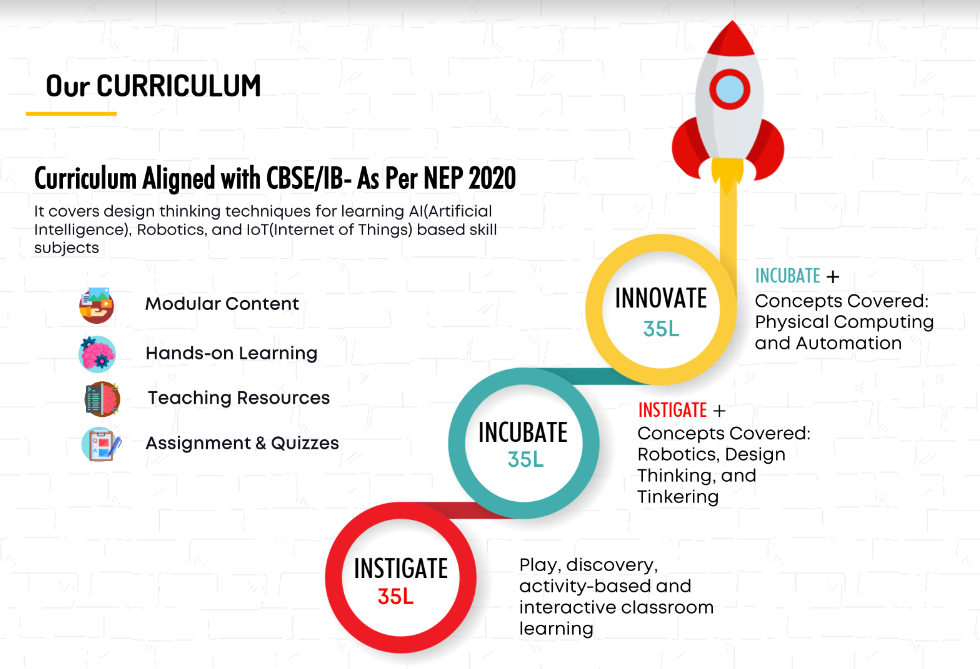
Why is a Tinkering Lab A Good Option For Schools?
Tinkerly’s Tinkering Lab:
- The Tinkering Lab offered by Tinkerly follows the National Education Policy(NEP 2020) mapped Curriculum that strongly emphasizes the value of Robotics, Coding, IoT, AI and coding education in the modern world.
- Five days initial training session to all the teachers.
- 2 + 2 days on demand training shall be organized twice a year and 12 online monthly support to teachers.
- For each STEM activity, we provide a dedicated team of CRM & Trainer that interacts with students.
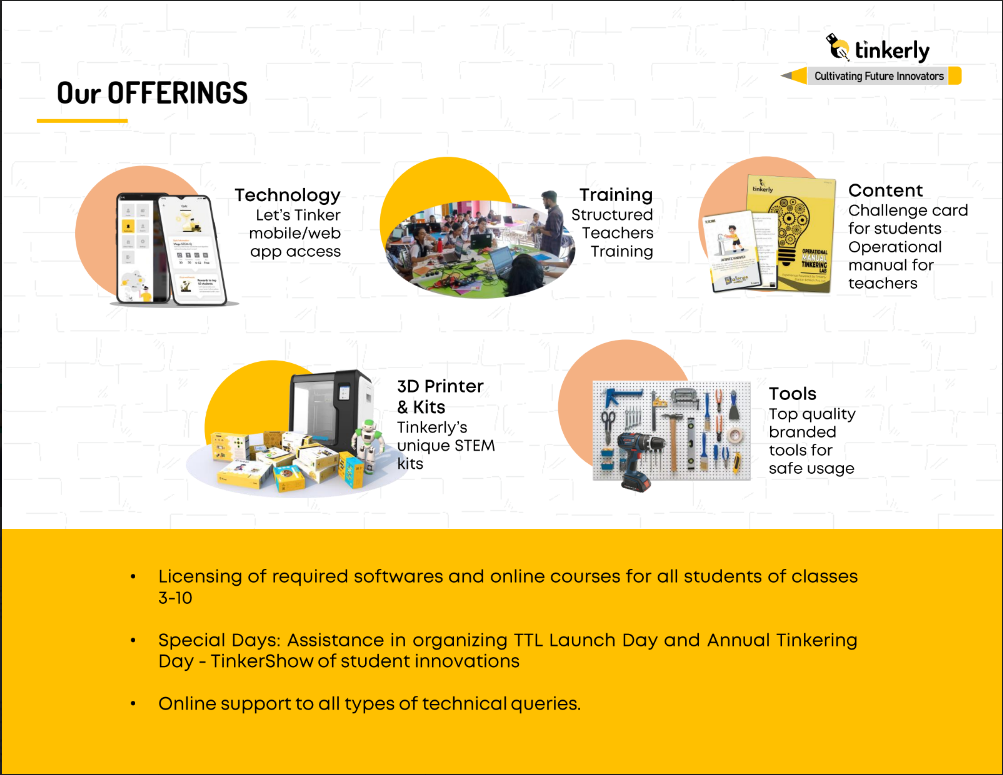
Conclusion
In fact, if we take a look at most of the scientific or engineering innovations, we would find that innovation happens when a few different theories are offered a blended together in a meaningful, focused way. It is what exactly happens in a Tinkering Lab where the students can not only practically experiment with the knowledge they have gained in the classroom but can also try to reshape the theories and see the altered results.
 46381
46381

